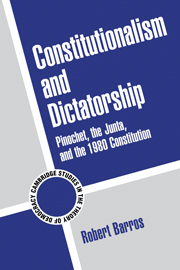Book contents
- Frontmatter
- Contents
- Foreword
- Acknowledgments
- Abbreviations
- Introduction
- 1 Dictatorship, Legality, and Institutional Constraints
- 2 The Constitution of the Exception: Defining the Rules of Military Rule
- 3 The Constitution and the Dictatorship: The Supreme Court and the Constitutionality of Decree-Laws
- 4 The Shadowy Boundary between Force and Law: The Judiciary, Repression, and the Cosmetic Limitation of Emergency Powers
- 5 Constitutionalization without Transition: Prompting the Dual Constitution of 1980
- 6 The Permanent Text: Constitutional Controls or Military Tutelage?
- 7 Even Custom Shoes Bind: Military Rule under the Constitution, 1981–1988
- 8 Military Dictatorship and Constitutionalism in Chile
- References
- Index
8 - Military Dictatorship and Constitutionalism in Chile
Published online by Cambridge University Press: 10 December 2009
- Frontmatter
- Contents
- Foreword
- Acknowledgments
- Abbreviations
- Introduction
- 1 Dictatorship, Legality, and Institutional Constraints
- 2 The Constitution of the Exception: Defining the Rules of Military Rule
- 3 The Constitution and the Dictatorship: The Supreme Court and the Constitutionality of Decree-Laws
- 4 The Shadowy Boundary between Force and Law: The Judiciary, Repression, and the Cosmetic Limitation of Emergency Powers
- 5 Constitutionalization without Transition: Prompting the Dual Constitution of 1980
- 6 The Permanent Text: Constitutional Controls or Military Tutelage?
- 7 Even Custom Shoes Bind: Military Rule under the Constitution, 1981–1988
- 8 Military Dictatorship and Constitutionalism in Chile
- References
- Index
Summary
Early in the evening of October 6, 1988, Pinochet appeared on national television. After a month of dressing in civilian attire, the general reappeared in uniform and specified for the people of Chile the precise consequences of the preceding day's events: “Neither the tenets nor the constitutional itinerary outlined have been in play, rather only the election of the person who should lead the country toward the full application of the Fundamental Charter during the following presidential period” (El Mercurio, October 7, 1988).
Among other things, Pinochet was indirectly reminding the nation that in accordance with the constitution, their refusal to grant him a second eight-year term still extended his term, as well as the Junta's, one year. In other words, although his presidential term ended March 10, 1989, T.D. 29 specified that Pinochet would remain president for another year and five months.
The Constitutional and Electoral Dénouement of 1989
Notwithstanding this remedial lesson in constitutional law, civilian political forces attached far broader implications to the victory of the “No.” Sectors of the Left demanded Pinochet's immediate resignation; others, including the PDC, called for early elections; and virtually all parties – from the Left to the Right – called for (or accepted the need for) constitutional reforms. Within days of the plebiscite, the PDC and the rightist Renovación Nacional (RN) had each publicly presented proposals for reform, and by late December the new Minister of the Interior, Carlos Cáceres, announced that he would begin talks with the parties.
These negotiations proceeded by fits and starts, as the constitutional question immediately became intertwined with various political strategies once all parties began to jockey for position heading toward the presidential and congressional elections.
- Type
- Chapter
- Information
- Constitutionalism and DictatorshipPinochet, the Junta, and the 1980 Constitution, pp. 308 - 326Publisher: Cambridge University PressPrint publication year: 2002



